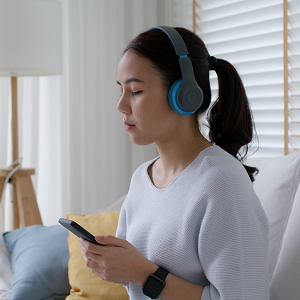Using Technology to Promote Engagement with Mental Health Offerings
 By Jenny Haykin, Integrated Leaves & Accommodations Program Manager, Puget Sound Energy
By Jenny Haykin, Integrated Leaves & Accommodations Program Manager, Puget Sound Energy
In early January 2020, Puget Sound Energy (PSE) launched an online mental health training for employees. Later that same month, the first U.S. case of COVID-19 was diagnosed in Washington state. The timing was a remarkable coincidence, as work on PSE’s mental health program had started well before 2020.
Research into mental health offerings began at PSE in 2018, with training development in 2019. PSE designated a corporate safety goal of a 95% employee completion rate for the training in 2020 and made it available online through the training management system to ensure easy access for all 3,200 employees.
Engagement
Within two months, COVID-19 was sweeping the nation and exacerbating what many call a mental health crisis. The PSE mental health training helped inform employees about available resources including the company’s highly utilized and branded wellness program, and there was unprecedented engagement. Visits to the company’s mental health resources web page jumped from fewer than a dozen per week at the end of 2019 to more than 100 in 2020, with notable spikes during civil unrest, wildfires, and the presidential election.
The team tracked engagement and saw the biggest spikes in website visits during weeks when two presentations titled Finding Happiness in Winter and Telecommuting Fatigue were posted. As limitations of the pandemic began to ease so did visits to the mental health web page. By the second half of 2021, use of the website dropped into the 20-40 visits per week range and have continued to decline. This was not a surprise to the integrated leaves and accommodations program team, which anticipated less utilization as the stressors from the early stages of the pandemic lessened.
PSE continues to provide new mental health safety goals each year given the positive feedback received for the first mental health training, which was developed and presented by the integrated leaves and accommodations program manager.
Mental Health Programming
In 2021, the goal was to have employees view educational videos about cognitive-behavioral techniques to promote their own resilience. In 2022, a new video was released each quarter with employee testimonials about how they addressed alcoholism, being stalked, living with long COVID, and battling cancer as well as the company resources they used for help. The series has continued in 2023, due to more than 600 positive employee survey responses about the personal stories in the videos.
The company’s video series and mental health training are not the only technology-based mental health offerings. There are multiple apps and online mental health resources from benefits vendors available to employees that are shared on the company’s mental health page, during trainings, and through regular benefits communications. Some of those resources are included in the list of technology-based mental health programs below.
To keep current on mental health apps and other wellness offerings, PSE checks in with its vendors on a regular basis. Meetings with the wellness vendors are biweekly; meetings occur with the medical care vendor monthly; and there are ad-hoc meetings with the smaller, local employee assistance program provider.
The wellness program includes activities offered by two vendors that were competitors in PSE’s selection process. One provides a mindfulness platform and the other has a resilience focus. PSE chose to work with them both, which proved beneficial for PSE employees who use both platforms.
Driving Value
Employees benefit from program content and receive points for using the wellness program. When they reach 1,000 points, employees receive a credit to apply to their health insurance premiums the following year. In 2022, employees completed 7,489 sessions and 748 courses on various topics including meditation, one-minute breaks, sleep, and emotional intelligence.
Company data show that 782 employees have participated in an average of 22 resilience-related events between January and October 2022, which help employees manage burnout, stress, and anxiety. Top events include trainings and activities on observing thoughts, stopping negative thoughts, learning how to appreciate things differently, the value of hydration, and meditation.
Here are a few of the technology-based mental health programs to consider:
- meQuilibrium (MeQ) offers resilience training and educational videos on cognitive behavioral techniques.
- ReThinkCare offers a mindfulness and meditation platform.
- Calm offers meditation and sleep sessions and is designed to help lower stress and reduce anxiety.
- myStrengthprovides personalized plans to improve mental health, including tools for managing stress, goal setting, progress tracking, and meditating.
- BetterHelp offers the opportunity to talk to a counselor anywhere — via computer, tablet, or smartphone.
- Talkspace provides online therapy.
PSE prioritizes mental health and encourages employees to use resources to assess and maintain their mental wellness on a regular basis. Technology makes access easier for employees to engage with resources any time they need them.



